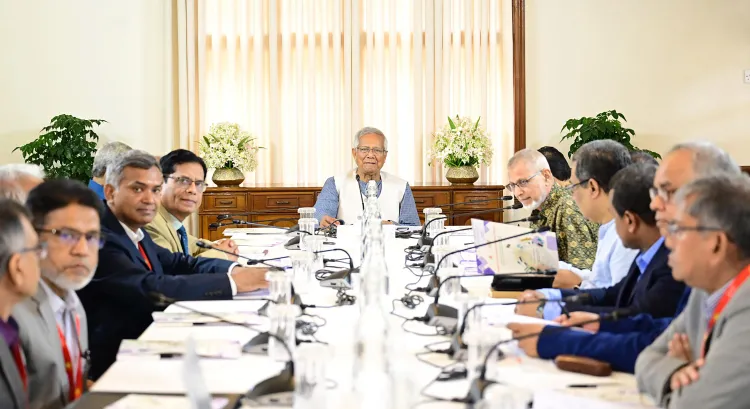What Frustrations Do Reform Commission Members Have with the Yunus Government?

Synopsis
Key Takeaways
- Reform commission members express dissatisfaction over the lack of progress in implementing reforms.
- Women's perspectives are being marginalized in the reform process.
- Critical issues such as gender-based violence remain unaddressed.
- Urgent action is needed to prioritize labor rights and workers' welfare.
- The interim government must reevaluate its reform agenda to include marginalized voices.
Dhaka, Sep 3 (NationPress) Several chairpersons and members of reform commissions have expressed their discontent regarding the lack of noticeable advancements in reforms under the leadership of the Muhammad Yunus-led interim government.
They emphasized that more than a year since the interim government took charge, their functions have primarily revolved around submitting proposals without any significant implementation, as reported by local media.
Moreover, they pointed out that women’s perspectives are being marginalized in the reform initiatives.
These comments were made during an event hosted by the Citizens' Platform for Sustainable Development Goals (SDG), Bangladesh, which also saw the introduction of a new initiative called 'Bangladesh Reform Watch'.
Despite the formation of 11 commissions in two phases—six in the first phase and five in the second aimed at facilitating reforms across diverse sectors—limited progress has been observed, the speakers noted.
"What existed before remains unchanged. Local government, media, health, and women’s commissions are in a precarious state. Those who were optimistic about reforms are now disheartened as nothing has progressed beyond mere report writing," quoted Tofail Ahmed, chairman of the Local Government Reform Commission, from Bangladesh’s leading newspaper, The Daily Star.
Syed Sultan Uddin Ahmed, Chairman of the Labour Reform Commission, voiced his frustration over the lack of execution of vital reforms, including minimum wage and workers' rights.
“We didn’t anticipate reforms to occur instantly, but at least some actions should have commenced. Unfortunately, that hasn’t taken place, which is profoundly disappointing,” he remarked.
Members of the Women’s Affairs Reform Commission also expressed concerns regarding the neglect of the women’s commission and a disturbing rise in gender-based violence throughout Bangladesh.
“Among all the commissions, the Women’s Affairs Reform Commission is in the most vulnerable state. Over the past year, women’s rights have not been upheld, and violence against women has not diminished. In certain regions, especially the Chittagong Hill Tracts, the situation has deteriorated,” stated Nirupa Dewan, a commission member.
Meanwhile, renowned Bangladeshi economist Rehman Sobhan warned, “If reforms are not accomplished, the election could be jeopardized, and some individuals may abstain from participating. However, what remains unclear is which reforms need to be executed.”
Furthermore, Debapriya Bhattacharya, a distinguished fellow at the Dhaka-based think tank Centre for Policy Dialogue (CPD), raised concerns about the stagnation in the interim government’s reform endeavors. He also pointed out the absence of representation from marginalized groups, minorities, and disadvantaged communities within the reform committees.
“Conversations were primarily held with political figures, excluding ordinary citizens. Consequently, reform proposals have stalled,” he noted.
Bhattacharya observed that amid political changes and election preparations, the interim government appears to have lost its direction.
Shaheen Anam, Executive Director of Manusher Jonno Foundation, questioned the omission of issues concerning children—particularly street children and child laborers—from the reform agenda. She remarked that with rising concerns around equality, poverty, child abuse, violence, and attacks on minorities, Bangladesh is unlikely to meet the SDGs.









